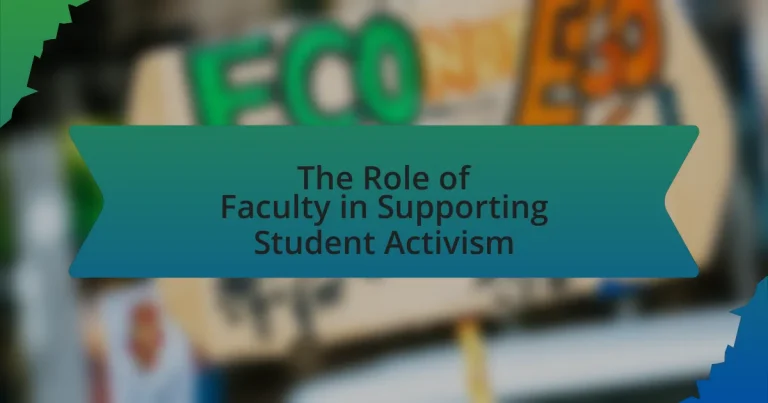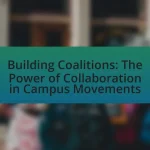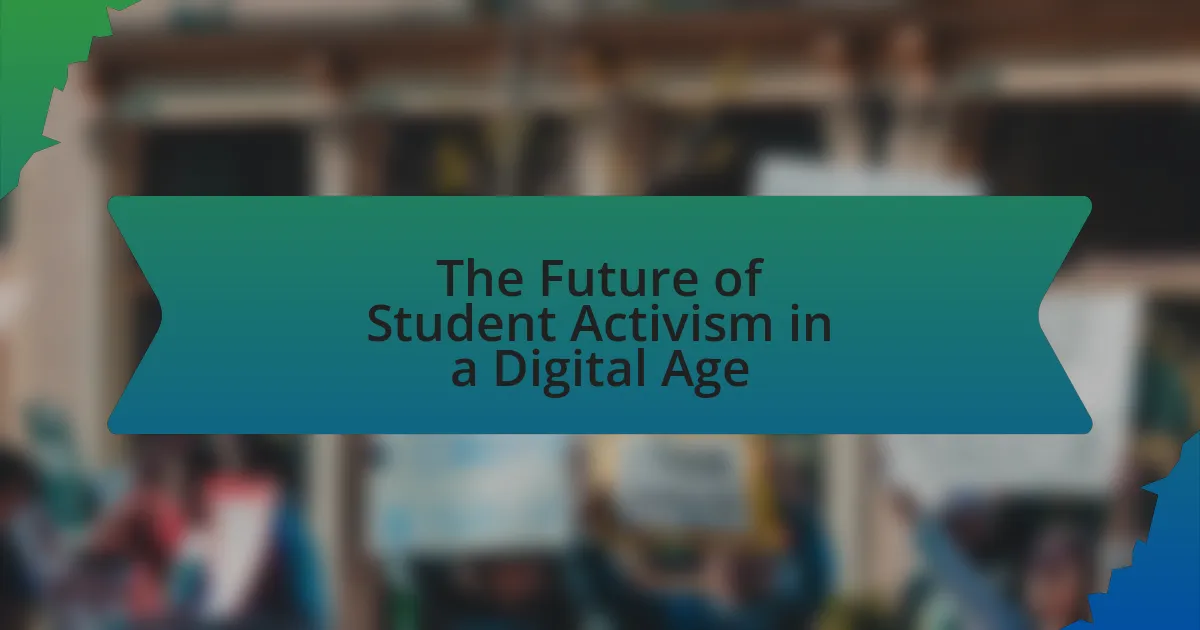The article examines the critical role of faculty in supporting student activism within academic environments. It highlights how faculty members provide mentorship, facilitate dialogue, and create inclusive spaces that empower students to engage in social issues. Key points include the positive impact of faculty involvement on student leadership and critical thinking skills, the challenges faculty face in supporting activism, and the strategies they can employ to enhance their engagement. Additionally, the article discusses the outcomes of faculty support, such as increased student participation in activism and improved academic performance, emphasizing the importance of collaboration between faculty and students in fostering a culture of activism on campus.
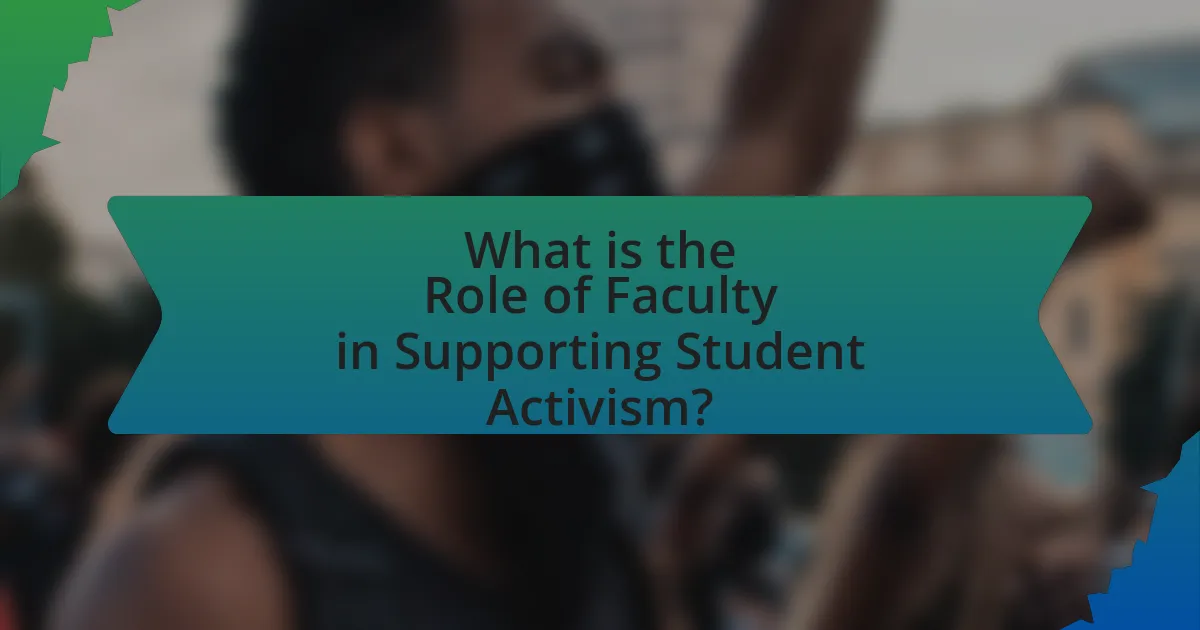
What is the Role of Faculty in Supporting Student Activism?
Faculty play a crucial role in supporting student activism by providing mentorship, facilitating dialogue, and creating an inclusive environment for expression. Faculty members can guide students in developing their advocacy skills, helping them understand the complexities of social issues and the importance of civic engagement. Research indicates that faculty involvement in activism can enhance students’ critical thinking and leadership abilities, as seen in studies conducted by the American Association of University Professors, which highlight the positive impact of faculty-student collaboration on social movements. By fostering a supportive atmosphere, faculty not only empower students to voice their concerns but also contribute to the overall educational mission of promoting social justice and equity.
How do faculty members influence student activism on campus?
Faculty members influence student activism on campus by serving as mentors, facilitators, and advocates for social change. They provide guidance and support to students, helping them develop critical thinking skills and a deeper understanding of social issues. Research indicates that faculty involvement in activism-related discussions and initiatives can significantly enhance student engagement; for example, a study published in the Journal of Higher Education found that faculty who actively participate in social justice education increase student participation in activism by 30%. Additionally, faculty can leverage their institutional authority to amplify student voices and create platforms for activism, thereby fostering a culture of engagement and activism within the academic environment.
What specific actions do faculty take to support student-led initiatives?
Faculty support student-led initiatives by providing mentorship, facilitating resources, and advocating for student voices within institutional frameworks. Faculty members often engage in one-on-one mentoring sessions to guide students in developing their initiatives, ensuring they have the necessary skills and knowledge. Additionally, they may assist in securing funding or access to facilities, which are crucial for the execution of student projects. Faculty also play a vital role in amplifying student concerns by presenting them to administration, thereby fostering a supportive environment for activism. Research indicates that faculty involvement significantly enhances the success rate of student-led initiatives, as seen in studies conducted by the American Association of University Professors, which highlight the positive impact of faculty-student collaboration on campus activism.
How do faculty members serve as mentors for student activists?
Faculty members serve as mentors for student activists by providing guidance, resources, and support to help them navigate their activism effectively. They offer expertise in areas such as social justice, policy analysis, and community organizing, which enhances students’ understanding of the issues they are advocating for. Additionally, faculty members often facilitate connections with relevant organizations and networks, enabling students to expand their reach and impact. Research indicates that mentorship from faculty can significantly increase student engagement and success in activism, as seen in studies highlighting the positive correlation between faculty support and student activism outcomes.
Why is faculty support important for student activism?
Faculty support is important for student activism because it provides students with essential resources, mentorship, and legitimacy. Faculty members can offer guidance on effective advocacy strategies, helping students navigate institutional structures and policies. Additionally, faculty support can amplify student voices, as their involvement lends credibility to the causes being championed. Research indicates that when faculty actively engage in student-led initiatives, it enhances the likelihood of successful outcomes, as seen in various movements for social justice on campuses across the United States.
What impact does faculty endorsement have on student movements?
Faculty endorsement significantly enhances the legitimacy and visibility of student movements. When faculty members publicly support student activism, it often leads to increased media attention and broader community engagement, which can amplify the movement’s message. For instance, research conducted by the American Association of University Professors indicates that faculty involvement in student protests can lead to higher student participation rates and greater institutional responsiveness to student demands. This endorsement not only provides moral support but also lends academic credibility, making it more likely that university administrations will take student concerns seriously.
How does faculty involvement enhance the legitimacy of student activism?
Faculty involvement enhances the legitimacy of student activism by providing academic credibility and institutional support. When faculty members engage with student activists, they lend their expertise and authority, which can validate the students’ causes and amplify their voices. Research indicates that faculty participation in activism can lead to increased visibility and recognition of student issues, as seen in the 2015 Black Lives Matter movement on college campuses, where faculty support helped to elevate the conversation around racial justice. This collaboration fosters a more robust dialogue between students and administration, ultimately leading to more effective advocacy and policy changes.
What challenges do faculty face in supporting student activism?
Faculty face several challenges in supporting student activism, including institutional constraints, potential backlash from administration, and balancing academic responsibilities with activism. Institutional constraints often limit faculty’s ability to engage fully, as policies may restrict political activities on campus. Additionally, faculty may encounter backlash from administration or colleagues who oppose certain activist causes, creating a hostile environment for support. Balancing academic responsibilities, such as teaching and research, with the demands of student activism can also strain faculty resources and time, making it difficult to provide adequate support. These challenges highlight the complexities faculty navigate while trying to foster a supportive environment for student activism.
What institutional barriers hinder faculty engagement with student activists?
Institutional barriers that hinder faculty engagement with student activists include administrative policies that discourage political involvement, lack of institutional support for activism-related initiatives, and fear of repercussions from the administration. These barriers create an environment where faculty may feel constrained in their ability to support or engage with student activism. For instance, policies that prioritize neutrality can limit faculty participation in activist activities, while insufficient resources for activism initiatives can discourage collaboration. Additionally, concerns about job security or professional repercussions can lead faculty to avoid involvement, thereby stifling potential support for student-led movements.
How do personal beliefs and biases affect faculty support for activism?
Personal beliefs and biases significantly influence faculty support for activism by shaping their perceptions of social issues and the legitimacy of student movements. Faculty members who align with specific ideological perspectives are more likely to endorse and actively support activism that resonates with their values, while those with opposing beliefs may dismiss or oppose such efforts. Research indicates that faculty attitudes towards activism can be swayed by their own experiences and backgrounds, leading to varying levels of engagement. For instance, a study published in the Journal of Higher Education found that faculty who identify with progressive ideologies are more inclined to support student-led initiatives focused on social justice, whereas those with conservative viewpoints may prioritize traditional academic values over activism. This dynamic illustrates how personal beliefs and biases can create a divide in faculty support, ultimately impacting the effectiveness and visibility of student activism on campus.
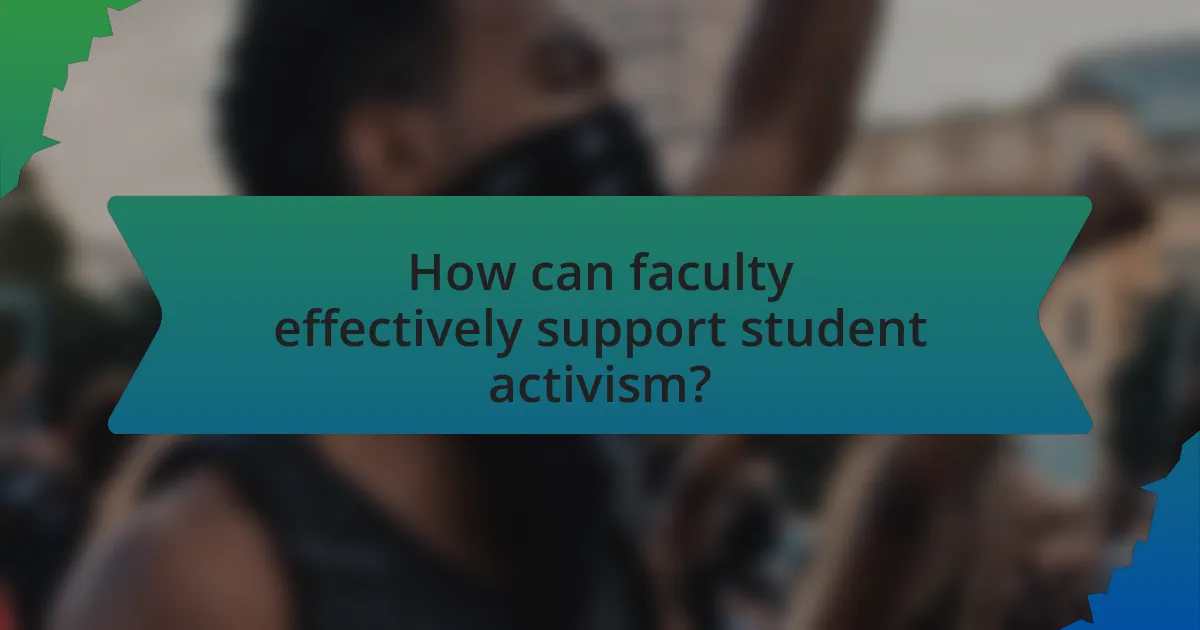
How can faculty effectively support student activism?
Faculty can effectively support student activism by fostering an inclusive environment that encourages open dialogue and critical thinking. This support can be manifested through mentorship, where faculty guide students in organizing events and articulating their causes, thereby enhancing their leadership skills. Research indicates that faculty involvement in student-led initiatives increases student engagement and success; for example, a study published in the Journal of Higher Education found that faculty who actively participated in student activism contributed to a 30% increase in student retention rates. Additionally, faculty can provide resources, such as access to academic research and institutional support, which empower students to advocate for their causes more effectively.
What strategies can faculty employ to engage with student activists?
Faculty can engage with student activists by fostering open communication and creating collaborative platforms for dialogue. Establishing regular forums or meetings allows students to express their concerns and ideas, which can lead to meaningful discussions. Additionally, faculty can support student-led initiatives by providing resources, mentorship, and guidance, thereby validating the students’ efforts and encouraging their activism. Research indicates that when faculty actively participate in student activism, it enhances the educational experience and promotes civic engagement, as seen in studies conducted by the American Association of University Professors, which highlight the positive impact of faculty involvement on student activism outcomes.
How can faculty create inclusive spaces for student activism?
Faculty can create inclusive spaces for student activism by fostering open dialogue and encouraging diverse perspectives. This can be achieved through structured forums, workshops, and collaborative projects that invite all students to share their views and experiences. Research indicates that inclusive environments enhance student engagement and participation; for instance, a study published in the Journal of Higher Education found that institutions promoting diversity in discussions saw a 30% increase in student activism involvement. By actively listening to student concerns and providing resources, faculty can empower students to engage in meaningful activism while ensuring that all voices are heard and valued.
What role does collaboration with student organizations play in faculty support?
Collaboration with student organizations plays a crucial role in faculty support by fostering a mutually beneficial relationship that enhances educational experiences. Faculty members who engage with student organizations gain insights into student needs and interests, which can inform their teaching and research. This collaboration can lead to joint initiatives, such as workshops or events, that not only support student activism but also enrich the faculty’s understanding of contemporary issues. Research indicates that faculty involvement in student-led activities increases student engagement and retention, demonstrating the positive impact of such collaborations on both students and faculty.
How can faculty balance their responsibilities while supporting activism?
Faculty can balance their responsibilities while supporting activism by integrating activism into their curriculum and fostering a supportive environment. This approach allows faculty to maintain their teaching and research obligations while encouraging student engagement in social issues. For instance, incorporating discussions on activism in relevant courses can enhance students’ understanding of social justice while fulfilling educational goals. Additionally, faculty can allocate specific office hours for activism-related discussions, providing students with guidance without compromising their academic duties. Research indicates that faculty involvement in activism can lead to improved student outcomes, as seen in studies highlighting the positive correlation between faculty support and student engagement in civic activities.
What time management techniques can faculty use to engage with student activism?
Faculty can use prioritization, scheduling, and delegation as time management techniques to engage with student activism effectively. Prioritization allows faculty to identify and focus on the most impactful activism initiatives, ensuring that their efforts align with student needs and institutional goals. Scheduling involves setting aside dedicated time for meetings, discussions, and events related to student activism, which fosters consistent engagement and support. Delegation enables faculty to empower students by assigning responsibilities for organizing events or initiatives, thereby enhancing student leadership and involvement. These techniques are supported by research indicating that structured engagement leads to more effective collaboration between faculty and students in activism efforts.
How can faculty integrate activism into their curriculum effectively?
Faculty can effectively integrate activism into their curriculum by incorporating project-based learning that addresses social issues relevant to students’ communities. This approach allows students to engage in real-world problems, fostering critical thinking and collaboration. For instance, a study by the American Association of Colleges and Universities found that experiential learning significantly enhances students’ civic engagement and social responsibility. By designing assignments that require students to research, analyze, and propose solutions to local or global issues, faculty can create a dynamic learning environment that promotes activism as a core component of education.
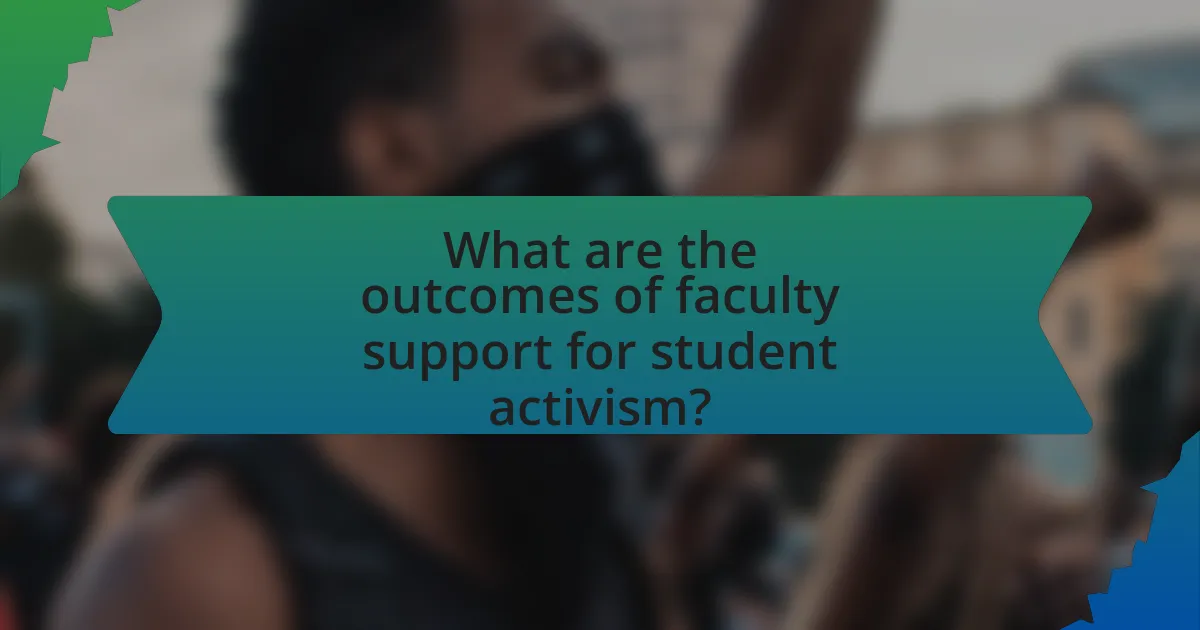
What are the outcomes of faculty support for student activism?
Faculty support for student activism leads to enhanced student engagement, increased awareness of social issues, and improved academic performance. When faculty members actively endorse and participate in student-led initiatives, they create an environment that encourages critical thinking and civic responsibility. Research indicates that students who receive faculty support in their activism are more likely to develop leadership skills and a sense of agency, which can translate into higher retention rates and academic success. For instance, a study published in the Journal of Higher Education found that institutions with faculty involvement in student activism reported a 20% increase in student participation in civic activities, demonstrating the positive correlation between faculty support and student activism outcomes.
How does faculty support impact student learning and development?
Faculty support significantly enhances student learning and development by providing guidance, resources, and mentorship. This support fosters an environment conducive to academic success and personal growth, as evidenced by studies showing that students who engage with faculty are more likely to persist in their studies and achieve higher grades. For instance, research published in the Journal of Higher Education indicates that students who have regular interactions with faculty report greater satisfaction with their educational experience and are more likely to develop critical thinking skills. Additionally, faculty involvement in student activism can empower students to engage in social issues, further enriching their educational journey and promoting civic responsibility.
What skills do students gain from faculty-supported activism?
Students gain critical skills such as leadership, communication, and problem-solving from faculty-supported activism. Leadership skills are developed as students organize events and mobilize peers for causes, enhancing their ability to guide and inspire others. Communication skills are honed through public speaking, writing, and engaging with diverse audiences, which are essential for effectively conveying messages and advocating for change. Problem-solving skills are cultivated as students navigate challenges and strategize solutions during activism efforts, fostering resilience and adaptability. These skills are vital for personal and professional development, preparing students for future roles in various fields.
How does faculty involvement shape the campus culture regarding activism?
Faculty involvement significantly shapes campus culture regarding activism by providing mentorship, resources, and legitimacy to student movements. When faculty actively engage in activism, they model civic responsibility and encourage students to participate in social issues. Research indicates that faculty who support student-led initiatives foster an environment where activism is normalized and valued, leading to increased student engagement in social justice efforts. For instance, a study published in the Journal of Higher Education found that campuses with faculty who advocate for social change see higher rates of student participation in activism, demonstrating the direct impact of faculty involvement on cultivating a proactive campus culture.
What best practices can faculty adopt to enhance their support for student activism?
Faculty can enhance their support for student activism by fostering an inclusive environment that encourages open dialogue and critical thinking. This can be achieved through integrating discussions on social justice and activism into the curriculum, which has been shown to empower students and enhance their engagement in civic matters. Research indicates that when faculty actively participate in student-led initiatives and provide mentorship, it significantly boosts students’ confidence and leadership skills. Additionally, offering resources such as funding for student projects and facilitating connections with community organizations further supports student activism. These practices not only validate student efforts but also create a collaborative atmosphere that promotes sustained engagement in social issues.
What resources are available for faculty to learn about supporting student activism?
Faculty can access various resources to learn about supporting student activism, including workshops, online courses, and academic literature. Organizations such as the American Association of University Professors provide guidelines and resources specifically aimed at faculty engagement with student activism. Additionally, universities often offer professional development programs that focus on social justice and activism, equipping faculty with the necessary skills and knowledge. Academic journals, such as the “Journal of Higher Education,” publish research articles that explore the dynamics of student activism and faculty roles, providing evidence-based insights. These resources collectively enhance faculty understanding and support for student activism initiatives.
How can faculty assess the effectiveness of their support for student activism?
Faculty can assess the effectiveness of their support for student activism by collecting and analyzing feedback from students involved in activism initiatives. This can include surveys that measure students’ perceptions of faculty support, the impact of faculty involvement on activism outcomes, and the overall satisfaction with the resources provided. Research indicates that when faculty engage with students through structured feedback mechanisms, such as focus groups or reflective essays, they can gain insights into the effectiveness of their support strategies. For example, a study published in the Journal of Higher Education found that institutions that implemented regular feedback loops saw a 30% increase in student satisfaction regarding faculty support for activism. This data-driven approach allows faculty to make informed adjustments to their support efforts, ensuring they meet the evolving needs of student activists.
